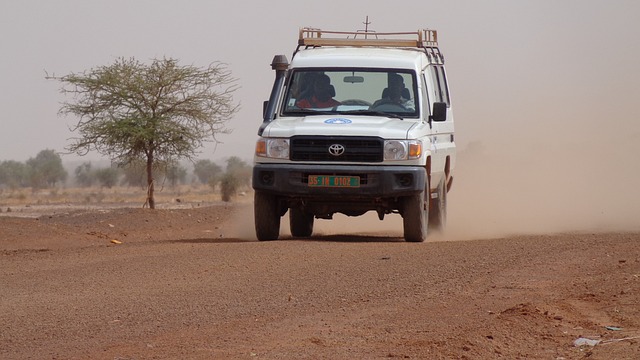How to Become an International Aid Worker
An Experienced Professional Explains How It's Done
by Matthew Bolton
Resources updated 6/2/2024 by Transitions Abroad

|
|
Taking care of young girls is often a part of humanitarian aid work.
|
I have an incredible job. Initially as a volunteer and later as a consultant to international nonprofit aid agencies, I have worked in ten countries, including Bosnia and Iraq.
I have worked alongside a former Marxist guerrilla, arranged financing for landmine clearance, helped organize relief convoys to conflict zones, talked with some of the poorest people in the world, and watched international
diplomats dancing to folk music in a garden surrounded by minefields.
It is a great opportunity for people who don’t want to spend their lives pecking at keyboards in cubicle farms. However, be warned: it is not a traditional career path. Being an aid worker requires an ability to adapt to
intensely challenging situations and withstand emotional strain.
Aid work is also unlike any other profession in that it is often very difficult to get your foot in the door. Since aid agencies’ work is global, they have truly international workforces; one competes for one’s job with
intelligent, skilled, and well-motivated people from all over the world.
It is highly unlikely that you will get a well-paid position with significant responsibilities straight out of university. However, if you work at shaping yourself into an ideal candidate, you will start getting good job
offers two to three years into your career.
How to Get Started As an Aid Worker

|
|
Often riding into remote areas is part of humanitarian aid work.
|
Here are the elements I have found most important in getting started in the aid work field:
Know your motivations
It is said that in job interviews for the International Committee of the Red Cross, one of the world’s most important humanitarian agencies, sometimes applicants are asked “What are you running
away from?” Indeed, one has to have pretty strong (and perhaps strange) motivations to want to leave one’s home, family, and friends and go live in war zones and situations of poverty.
In Helen Fielding’s great satirical novel about aid workers, Cause Celeb, one of her characters wears a T-shirt “set out like a multiple choice questionnaire for relief workers. It reads: (a) Missionary? (b) Mercenary? (c)
Misfit? (d) Broken heart?
The missionary’s earnestness can be a sustaining factor but can be damaging when their ideology surfaces. While the mercenary types are often talented and pragmatic, it is morally questionable to exploit human suffering
for material gain. Misfits think outside the box but sometimes an inferiority complex or just plain weirdness can get in the way of a successful team. Finally, broken hearts may be willing to take risks and may be less easy to fool, but their
“issues” become tiring for others to hear about.
In reality there are good humanitarians with all kinds of motivations. What is important to think carefully about how your motivations might sometimes be a hindrance to your work.
Have something to offer and market it
This may sound obvious, but it is important to have skills, knowledge, or abilities that aid agencies need. Ideals cannot feed people. As the adage says, “The road to hell is
paved with good intentions.”
Engineers, agronomists, environmentalists, logisticians, linguists, and medical professionals are always in high demand because of their highly technical knowledge. Persons with other less obvious niche skills are also regularly
hired. Nonprofits have computer networks that need maintaining and so hire IT specialists. They handle enormous amounts of money and thus look for business and accounting professions. As large organizations they require experienced and skilled
managers.
That said, social science majors and liberal arts students need not be discouraged. I was a history and religion major, which on the surface seems rather unhelpful. However, the skills that got my foot in the door were writing
and research.
The big nonprofits are usually funded by government or UN agencies that require reams of documentation, reports, and proposals. Someone has to write these. Moreover, projects and programs need the support of social research
to measure their impact and appropriateness. Such tasks require good social scientists.
Finally, it is important to describe your skills to these agencies. If you never tell them, they will never know. Get your resume out there and begin talking to people “on the inside.”
Attributes
Aid workers come in all shapes and sizes and have widely variant personality types. However, there are some attributes that tend to be in common with the best humanitarians.
Integrity and accountability are very important as one handles large amounts of money and commodities. At the same time, an ability to compromise and diplomatically adapt to challenging situations is essential. Plans rarely
work out perfectly.
It helps to be tough and adventurous. Being able to roll with the punches and live in poor conditions will take you a long way. Whiners are not appreciated in a field office.
Finally, savviness and quickness to learn enable one to adjust to new cultures and languages rapidly.
Connections
For better or for worse, the old cliché, “It’s not what you know; it’s who you know,” is just as true for aid work as for any other profession. In fact, it is probably even more true. Working in complex
and stressful conditions of poverty and conflict, aid agency administrators want a team they can trust — thus there is a tendency to hire people they know well and have seen in action. It is essential to network and build contacts. Go to conferences,
use mutual friends to get introductions, and save business cards. Most importantly, bringing us to the next point, get good international experience.
International and Cross-Cultural Experience
It is difficult to overemphasize the importance of experience in getting a good position in humanitarian organizations. As noted above, employers want to hire people with
a track record, someone they can trust. Experience in a wide range of cultures and contexts shows that you are able to adjust and perform in difficult circumstances. It also means you are more likely to have the chance to learn new languages.
Getting in the Door
Of course, this brings up the paradox that you can’t get a job without experience and you can’t get experience without a job. With humanitarian work, one usually has to start from the very bottom as an intern or a volunteer.
This means you have to be willing to work for little or nothing when you start out.
Programs like the Peace Corps and Voluntary Service Overseas (VSO) are the best starting places because they provide
good training, language classes, support, and are well known. In addition, they provide a post-assignment network of contacts — returned Peace Corps volunteers tend to look out for each other.
My start was a little unorthodox. A friend of mine helped me arrange a stipendiary volunteer assignment with a nonprofit working in Bosnia. This way was a bit more difficult than a structured volunteer program, but it taught
me to be a self-starter.
If you have difficulty getting into aid work programs for medical or other reasons, study abroad or even local cross-cultural experience (for instance working with immigrant communities or teaching in a school whose students
are of a different culture than your own) can be a good start.
International Aid Work Resources
Thompson Reuters Foundation and ReliefWeb are portals that provide
extensive information about the countries and organizations involved in humanitarian relief in emergencies.
Peace Corps and Voluntary Service Overseas (VSO) are premier long-term international volunteer organizations. Peace Corps volunteers must be U.S. citizens; VSO admits citizens of several countries.
Devex is a good international humanitarian and development job listing site that tends to focus on mid-career rather than entry-level positions.
UNICEF is one of many organizations seeking aid workers.
Of course, the United Nations has many such jobs available worldwide.
|
MATTHEW BOLTON, a dual British and American citizen, is a freelance writer and a private consultant to humanitarian and development organizations.
|
